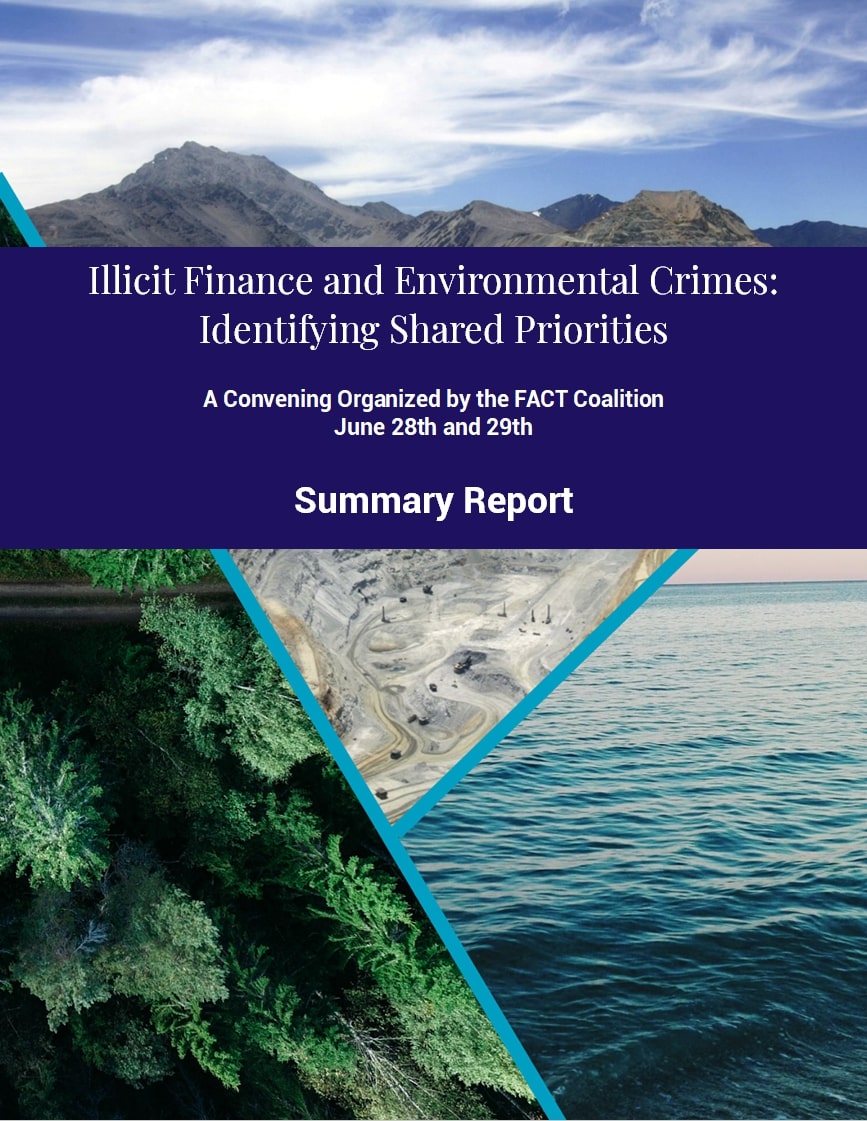On June 28th and 29th, the FACT Coalition convened anti-money laundering, illicit finance, environment, and climate policy makers, thought leaders, and activists to discuss ways to counter this growing threat posed by illicit finance and environmental crimes. The convening brought together more than 60 advocates and experts from government, international secretariats, and more than 30 civil society organizations to share lessons learned on the intersection of illicit finance and environmental crimes. The June 28th session under Chatham House rules lasted three hours, with an opening panel of three experts, followed by four commodity-specific case studies, and a concluding lightning round table on next steps for reform. This report details the presentations, discussions, and proposals offered as a part of the FACT-organized convening.
Convening Report – Illicit Finance and Environmental Crimes: Identifying Shared Priorities
Possible Priorities for Reform
In the last hour of the convening, policymakers and experts from around the world, including from “destination” governments and international organizations, offered their thoughts on what reforms were needed to fight environmental crimes and related illicit financial flows at both the international and domestic level. These reforms were offered for general consideration as a part of the day two of the report. As such, this list serves to detail possible avenues of reform, but they are not all FACT-endorsed recommendations.
Priorities to Advance Both Domestically and Internationally
- Public beneficial ownership registries should be set up around the world with a strong standard from the Financial Action Task Force to ensure useful data.
- Due diligence requirements should be extended across supply chains and to a broader range of products such as agricultural commodities linked to deforestation and minerals associated with serious human rights abuses, conflict financing and other financial crimes such as corruption, money laundering and tax evasion.
- Gatekeepers legislation (extending anti-money laundering due diligence obligations to professionals like lawyers, investment advisers, company formation agents, and others) as suggested in FATF’s recommendation 22 should be passed in countries that have not implemented such reforms, and advocates should push to strengthen laws where only partially implemented.
- Trade data should be shared more freely between countries and to the public to foster cooperation with foreign law enforcement and civil society alike.
- Greater cooperation on financial investigations is needed between authorities tracking environmental crime networks.
- Harmonization of environmental crime and money laundering rules should be pursued to ensure disruption, rather than displacement, of crime to more lenient jurisdictions.
Priorities to Advance Internationally
- Environmental Disclosures through the Extractive Industries Transparency Initiative should be made stronger and mandatory.
- National Money Laundering Risk Assessments Recommendations from the Financial Action Task Force should encourage national authorities to discuss environmental crimes.
Priorities to Advance Domestically
- Greater funding for financial investigation units should be allocated within national budgets to ensure authorities are up to the task.
- Money laundering predicate offenses should be expanded to include all environmental crimes.
- Designing foreign aid programs to provide source countries the capacity to crack down on lower level corruption and non-compliance.
- Guidance for responsible business conduct as recommended by the Organization for Economic Cooperation and Development and the United Nations should include guidance on avoiding involvement in environmental crime.
This list details the priorities offered during the roundtable discussion, not a definitive list of FACT-endorsed policies.

